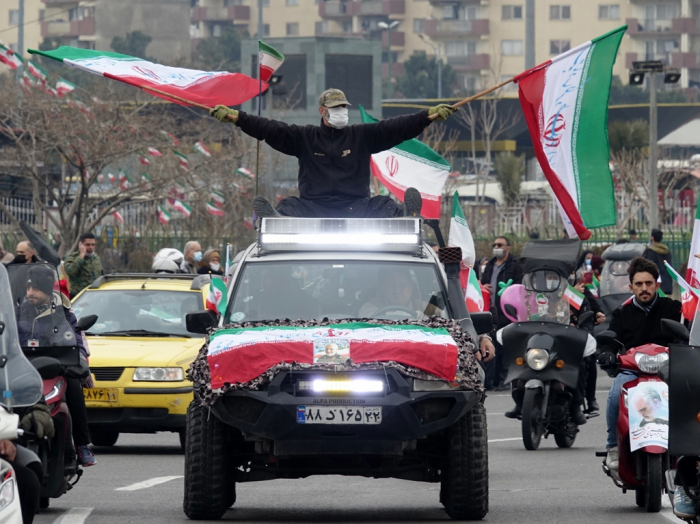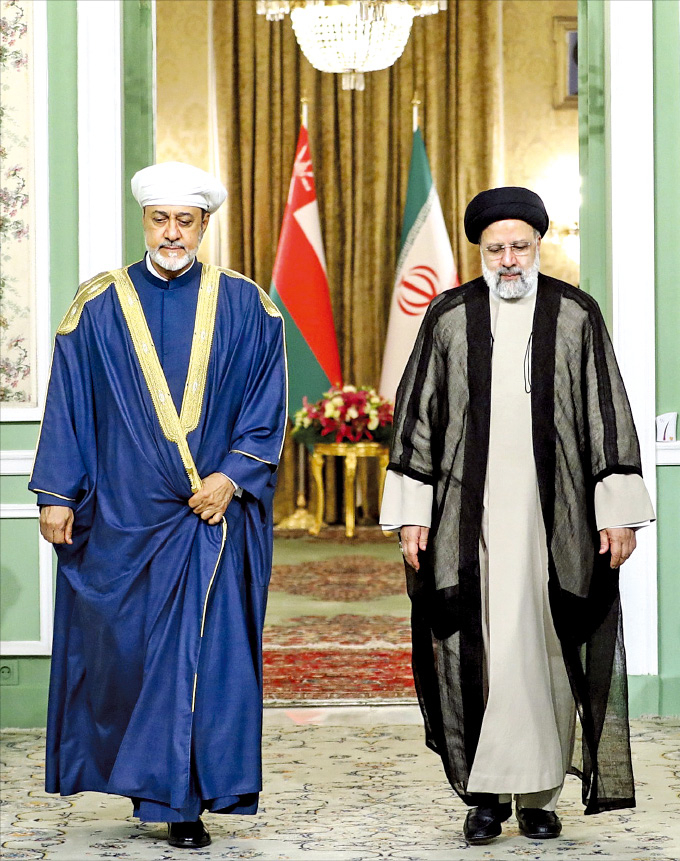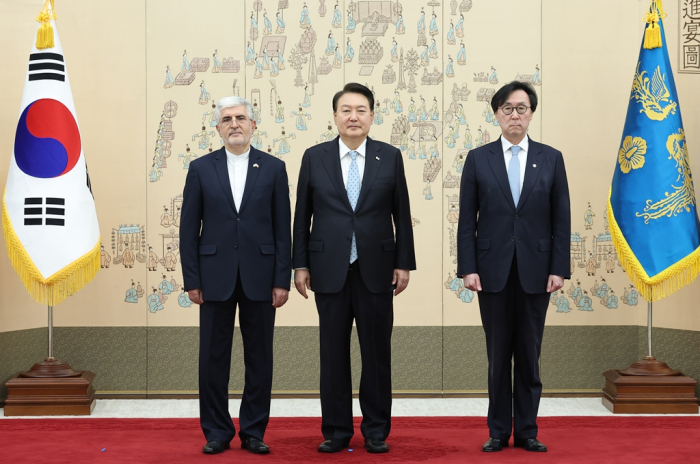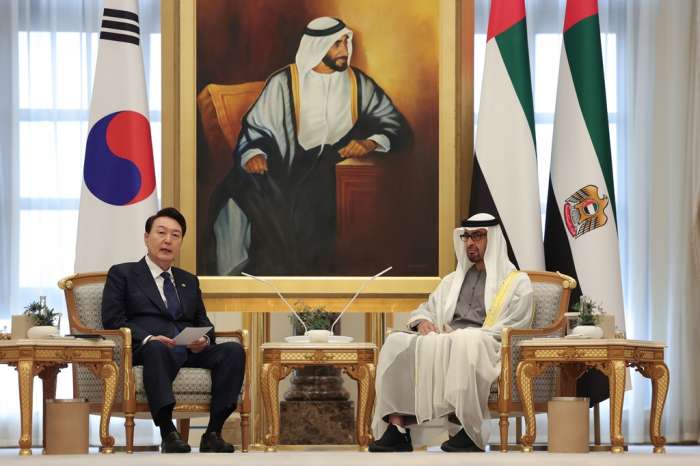Business & Politics
Seoul, Washington seek to release $7 bn Iranian funds frozen in S.Korea
The move will help Korea resume its business ties with Iran and boost Biden’s second presidential election bid
By May 30, 2023 (Gmt+09:00)
3
Min read
Most Read
LG Chem to sell water filter business to Glenwood PE for $692 million


KT&G eyes overseas M&A after rejecting activist fund's offer


Kyobo Life poised to buy Japan’s SBI Group-owned savings bank


StockX in merger talks with Naver’s online reseller Kream


Meritz backs half of ex-manager’s $210 mn hedge fund



South Korea and the US are discussing ways to release $7 billion worth of Iranian funds held in the Asian country as Seoul and Washington seek to improve economic and diplomatic relations with Tehran.
Korean and US government officials are involved in working-level discussions under Washington’s leadership to unfreeze the Iranian funds, diplomatic and government sources in Seoul said on Monday.
The release, if implemented, will come under stringent conditions that Iran use the funds only for public purposes such as for UN dues or purchasing COVID-19 vaccines, people familiar with the matter said.
“If all goes to plan, we expect our strained relationship with Iran to improve significantly,” said a Seoul government official.
If the talks are successful, the frozen money will be allowed to be transferred to Iranian bank branches in neighboring Middle Eastern countries, not directly to Iran, to monitor the flow and use of the funds, sources said.
Some local media in the Middle East have reported that a transfer of Iranian funds in Korea would come with the condition that Tehran releases a US hostage held in Iran on spying charges and limit uranium enrichment levels during nuclear development at 60%.

SEOUL-TEHRAN RELATIONS
Bilateral ties between South Korea and Iran have frayed in recent years due to Iranian money frozen at two commercial banks in Korea – Woori Bank and the Industrial Bank of Korea – since 2018 when the Donald Trump administration withdrew from the 2015 Iran nuclear deal, the Joint Comprehensive Plan of Action (JCPOA), and reimposed sanctions on Iran afterward.
The $7 billion owed for Korea’s oil imports is known to be the largest amount of Iranian funds frozen in a foreign country.
South Korea was previously one of Iran's biggest crude oil buyers in Asia.
Before the reimposition of US sanctions on Iran, Korean oil companies paid for their oil imports in Korean won through the Iranian central bank account in Seoul.
The Iranian central bank then settled the payments to Iranian oil exporters in its own currency – the Iranian rial.

Tehran has repeatedly demanded the release of its funds frozen in Korean banks under US sanctions, saying Seoul was holding the money "hostage."
As Korea-Iran relations soured, Tehran once incited a boycott of Korean products in Iran, targeting Samsung Electronics Co., and briefly seized a Korean oil tanker.
PRESIDENT YOON’S REMARKS
Seoul’s relations with Tehran apparently worsened earlier this year when Korean President Yoon Suk Yeol described Iran as the “enemy” of the United Arab Emirates during his trip to the UAE, where Korean troops are stationed.
While comparing the threat the UAE faces from Iran to the threat South Korea faces from North Korea, Yoon said: “The enemy of the UAE, its most-threatening nation, is Iran.”
Yoon’s remarks triggered an irritated response from Iran.

Analysts said if the $7 billion Iranian funds are released, it would significantly improve Seoul’s relations with Tehran, an energy and military power in the Middle East.
“There is nothing South Korea can gain from becoming an enemy of Iran,” said Sung Il-kwang, a Korea University professor. “Korea will benefit from gaining access to Iran’s huge market.”
The move to improve relations with Iran comes as President Joe Biden is making efforts to strengthen Washington's position in the Middle East ahead of the US presidential election next year.
Analysts said Biden also hopes to restrain China from gaining influence in the Middle East.
China's efforts to mediate the normalization of relations between Iran and Saudi Arabia and strengthen Beijing’s economic cooperation with Saudi Arabia pose a challenge for the US, they said.
Write to Ji-Hoon Lee at lizi@hankyung.com
In-Soo Nam edited this article.
More to Read
-
 Business & PoliticsUAE to find $2 bn investment opportunities in S.Korea
Business & PoliticsUAE to find $2 bn investment opportunities in S.KoreaMay 22, 2023 (Gmt+09:00)
1 Min read -
 Business & PoliticsUAE state funds gear up for $30 bn S.Korean investment
Business & PoliticsUAE state funds gear up for $30 bn S.Korean investmentMay 19, 2023 (Gmt+09:00)
3 Min read -
 Business & PoliticsSouth Korean companies ink $6.1 billion MOUs with UAE partners
Business & PoliticsSouth Korean companies ink $6.1 billion MOUs with UAE partnersJan 17, 2023 (Gmt+09:00)
3 Min read -
 Business & PoliticsUAE’s sovereign funds to invest $30 billion in South Korea
Business & PoliticsUAE’s sovereign funds to invest $30 billion in South KoreaJan 16, 2023 (Gmt+09:00)
2 Min read -
 Samsung GroupSamsung’s Lee visits UAE nuclear plant project on first trip as chairman
Samsung GroupSamsung’s Lee visits UAE nuclear plant project on first trip as chairmanDec 07, 2022 (Gmt+09:00)
2 Min read
Comment 0
LOG IN


